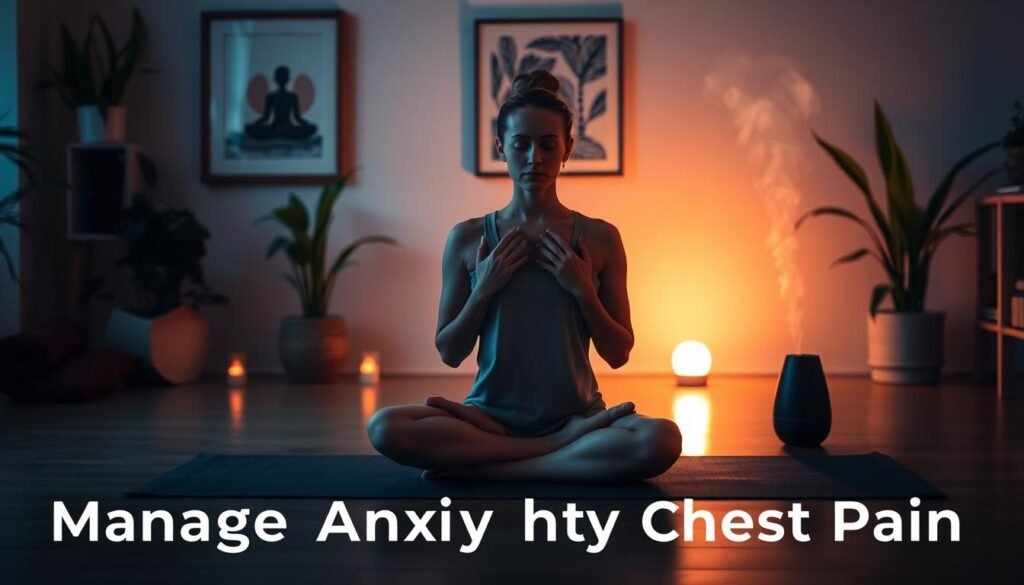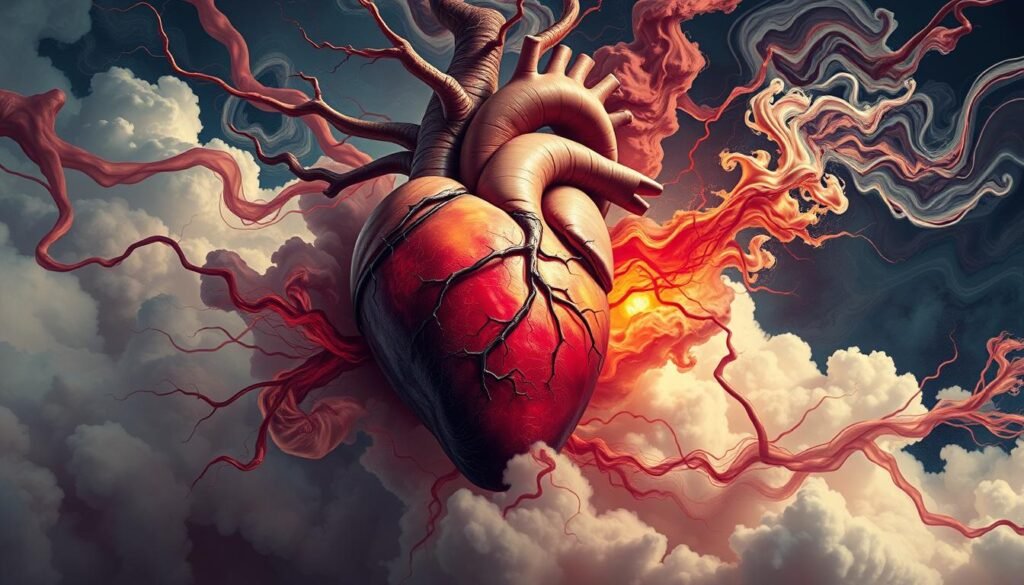Did you know up to half of the patients with low-risk chest pain in emergency departments are really experiencing anxiety? This fact shows how closely chest pain is linked to anxiety, not just heart attacks. People often fear the worst, thinking they’re having a heart attack, but anxiety might be the cause. Realizing this can stop unnecessary worry and emergency visits.
It’s key to recognize how anxiety can cause physical symptoms like chest discomfort. By understanding the link between chest pain and anxiety, individuals can make smarter health choices. This knowledge helps manage symptoms better, reducing stress for those affected.
Key Takeaways
- Anxiety affects between 25 to 50 percent of low-risk chest pain patients.
- About 30 percent of heart attack sufferers may not present with chest pain.
- Panic disorder symptoms often include chest pain and occur in 1-4 per 100 individuals.
- Chest pain can lead to unnecessary cardiac testing due to misattribution to anxiety.
- Understanding the symptoms of anxiety can prevent misdiagnosis and anxiety-induced panic.
An Overview of Chest Pain and Anxiety
Anxiety is our body’s natural way of reacting to danger. This reaction can lead to various physical symptoms, including chest pain. It’s important to understand the anxiety chest pain correlation because it can make people worry unnecessarily about their heart health. Surprisingly, nearly half of those who go to emergency rooms for chest pain find out it’s not heart-related. Even more, 30-40% learn that anxiety is the real reason for their pain.
Chest pain caused by anxiety is usually short, lasting about 10 minutes. However, other symptoms might stick around for nearly an hour. Pain from anxiety feels sharp but quick. On the other hand, heart-related pain can spread to the shoulder blades or jaw.
About 58% of chest pain cases aren’t due to heart problems but to panic attacks or anxiety. Anxiety attack symptoms can include a tingling sensation in the hands and fingers. This is quite different from what you’d feel during a heart attack. Also, anxiety attacks can happen suddenly and aren’t linked to physical effort, unlike heart attacks.
It’s key to recognize the psychological causes of chest pain for those facing these scary symptoms. If not addressed, ongoing anxiety could lead to high blood pressure or heart disease. Being aware of this link helps people get the right treatment, improving their health management.
Understanding Anxiety as a Response to Threat
Anxiety acts as a natural reaction to threats, causing the body to undergo changes. When we feel threatened, hormones like adrenaline and cortisol surge through us. This gets us ready for fight or flight. It speeds up the heart and raises blood pressure. This can feel like other serious health issues.
Many wonder if anxiety can make their chest hurt since the physical signs often seem like heart problems. About 70% of people with anxiety experience physical symptoms. This includes anxiety-induced chest discomfort. Indeed, chest pain is a common sign of anxiety. Studies find that 35% of those with anxiety feel this pain.
Muscle tension and hyperventilation are big reasons for this chest tightness. They affect many with anxiety. In crisis moments, heartbeats might shoot up, sometimes going beyond 130 beats per minute. This can make figuring out the problem hard. But, knowing that anxiety can cause these reactions helps people find the right treatment. Treatments like cognitive-behavioral therapy have shown to reduce anxiety and its physical symptoms over time.
Does Anxiety Cause Chest Pain?
Anxiety can indeed cause chest pain. Recognizing this starts with understanding how our bodies react to stress. When we feel anxious, our bodies release stress hormones. These hormones make our hearts beat faster and muscles tense. That can feel like something is wrong with our hearts.
The Mechanism Behind Anxiety-Induced Chest Pain
When we’re anxious, our bodies gear up as if there’s danger. This can cause chest discomfort. Adrenaline makes blood vessels tighter, which can feel like a heart attack. It’s important to note, about 25% of people with chest pain actually have anxiety.
Many might go to the emergency room, thinking it’s their heart. But it’s really anxiety causing their symptoms.
Evidence Linking Anxiety to Chest Pain
Many studies show a strong link between anxiety and chest pain. In emergency rooms, 25 to 50 percent of people with chest pain, but low heart risks, are very anxious. This shows how common anxiety is in these cases.
This chest pain from anxiety often lasts about 10 minutes. Sometimes, other symptoms like shortness of breath or heart pounding can last longer.
Common Symptoms of Anxiety-Related Chest Pain
Anxiety can cause chest discomfort that feels different than heart issues. It is vital to know these symptoms to tell them apart. By recognizing anxiety chest pain, you can manage it better.
Physical Manifestations of Anxiety
People describe anxiety chest pain in various ways. They might feel sharp pain, a persistent ache, or tightness. Burning sensations are also common.
The pain differs from person to person. Anxiety can make your heart race and muscles tense, leading to pain. High stress can prolong pain, making it hard to recover quickly.
How to Recognize Anxiety Chest Pain
To identify anxiety chest pain, note the context and other signs. You might feel dizzy, have trouble breathing, or panic. This type of chest pain often happens while resting, not when moving.
An essential fact is, anxiety chest pain usually lacks other heart attack signs. Knowing this can help in treating anxiety symptoms properly and seeking the right care when needed.

The Anxiety Chest Pain Correlation
There’s a strong link between anxiety and chest pain. Many people feel chest pain when they’re really stressed. About 30 to 40 percent of patients in emergency rooms, who are at low risk, report chest pain because of anxiety. Nearly half of these patients show signs of unusual anxiety.
Clinics often overlook this connection. Emergency room workers think 30 percent of patients they see, who likely don’t have heart issues, are actually anxious. But less than half of them talk to their patients about it. This can lead to unnecessary tests, missing the real problem.
Men and women feel this anxiety chest pain differently. Women tend to report more anxiety related to chest pain than men. Studies show that people with anxiety and unusual chest pain rarely have heart problems.
| Statistic | Percentage/Details |
|---|---|
| Prevalence of anxiety symptoms among patients with chest pain | 42% |
| Prevalence of depressive symptoms among patients with chest pain | 31% |
| Abnormal stress test prevalence | 15% |
| Gender distribution (women to men) | 65% women, 35% men |
| Mean age of patients | 50.4 years |
| Younger age group with abnormal anxiety/depression scores | Mean age 35 ± 10.0 vs. 54 ± 8 years |
| Anxiety prevalence in females with normal vs abnormal tests | Over double in normal tests |
| Anxiety prevalence in males with normal tests | More “moderate” to “severe” compared to abnormal tests |
| Negative tests in patients without anxiety/depression with typical pain | 8% men, 32% women |
| Negative tests in anxious and depressed patients with atypical pain | 97% men, 99% women |
| Current smokers with abnormal HADS scores | 57.9% vs. 34.1% among those with normal scores |
| Mean number of risk factors with abnormal vs normal HADS | 2.2 ± 1.3 vs 2.1 ± 1.1 |
Psychological Causes of Chest Pain
Stress can greatly cause chest pain. Studies show anxiety accounts for 30% to 40% of emergency room visits for chest pain. Often, individuals feel chest discomfort due to anxiety, thinking it’s heart-related. This misunderstanding adds unnecessary stress complicating their situation.
Anxiety and panic attacks can cause rapid breathing. This leads to hyperventilation, increasing chest muscle tension. A study in 2019 found 28% of people with chest pain but normal heart tests actually had panic attacks. This shows how much psychology affects chest pain perception.
Stress affects our well-being, worsening conditions like obesity, diabetes, and depression. Anxiety-related chest pain usually happens when resting. This is different from heart attack symptoms, which occur during physical activity. It’s key to know these differences to comprehend psychological chest pain causes.
To manage anxiety-related chest pain, treatments combine psychotherapy and medicine. Anti-anxiety drugs help with stress, while cognitive-behavioral therapy reduces pain and anxiety. These are for those with non-heart-related chest discomfort.
Acknowledging psychological factors is key, as many suffer anxiety impacting their life quality. Around 40% of people with non-cardiac chest pain suffer severe anxiety. This underscores the importance of addressing these psychological causes.
Distinguishing Between Anxiety-Induced Chest Pain and Cardiac Pain
Telling the difference between chest pain from anxiety and heart problems is tough. They share similar symptoms. Anxiety chest pain often gets better with relaxation techniques. Cardiac pain, however, usually means there’s a more serious issue.
Pain from panic attacks often feels sharp and comes on quickly. It usually goes away in a few minutes. But, cardiac pain often feels like pressure or squeezing. It can last longer. Heart attack pain can change in intensity but doesn’t just disappear.
Triggers can also help tell them apart. Emotional stress often leads to panic attacks. Physical activity can trigger heart attacks. Both conditions might cause shortness of breath and a feeling like something very bad is about to happen. Over 60% of people feel this way during panic attacks.
Heart attacks can also bring jaw pain, seen in about 15% of cases. Women might feel nausea and have trouble breathing. Knowing these differences is key to getting the right help quickly.
- Common symptoms of anxiety-related chest pain include:
- Sharp or shooting sensations
- Localized pain that may improve with deep breathing
- Typical symptoms of cardiac pain include:
- Pressure or squeezing sensation
- Radiating pain to arms, back, or jaw
- Severity ratings that fluctuate but persist
Understanding these differences is important. It helps people know when to seek medical help. If chest pain doesn’t go away or if you have other risk factors, get checked right away. Recognizing signs of anxiety-induced chest pain is key for handling and treating it well.
Managing Anxiety Chest Pain
Anxiety chest pain can throw off your day. But, you don’t have to let it. There are ways to ease the pain and keep moving forward. Trying out home remedies and learning new tricks can help. It’s about finding what works for you and knowing when it’s time to seek more help.
Home Remedies and Techniques for Relief
Several strategies exist for easing anxiety chest pain. Here are some proven methods:
- Deep Breathing Exercises: Slow, deep breaths can soothe your nerves, slow your heartbeat, and ease the pain.
- Mindfulness and Meditation: Mindfulness can make a big difference, improving anxiety management by 60%. It’s all about staying present and relaxed.
- Regular Physical Activity: Exercise can reduce anxiety by 20%-30%. It’s good for both your mind and your body.
- Visualization Techniques: Picturing a calm setting can bring instant stress relief. It helps combat panic attacks.
- Healthy Lifestyle Choices: Eating well, sleeping enough, and limiting alcohol or caffeine helps your mental health.
When to Seek Medical Help
Self-care works for many dealing with anxiety chest pain. But sometimes, you need a doctor’s opinion. Here’s when to get help:
- If chest pain sticks around for more than 10 minutes or gets really bad.
- If you start sweating, feeling dizzy, or faint.
- If you notice your heart racing or you’re short of breath.
- If you’ve had heart problems before or severe anxiety.
- If the pain is messing with your daily life or causing more panic attacks.
Knowing when to use home remedies and when to get medical help is key. Being proactive and informed helps you live better, even with anxiety chest pain.

Anxiety Chest Pain Treatment Options
Anxiety chest pain treatments help manage anxiety-related chest pain with many options. You can choose from drugs and non-drug methods. This ensures you find what works best for you.
Medicine options include SSRIs and benzodiazepines. These help control your mood and anxiety. SSRIs are good for long-term use. Benzodiazepines work fast for sudden anxiety.
Cognitive behavioral therapy (CBT) is great for those with anxiety chest pain. It teaches how to cope with anxiety and lessen chest pain. Therapists work with you to understand and change your anxiety-related thoughts and actions.
Using medicine, therapy, and changes in your lifestyle can really help. Here’s a table with common options and their details:
| Treatment Option | Type | Effectiveness | Considerations |
|---|---|---|---|
| SSRIs | Medication | Effective for long-term management | Possible side effects include nausea and insomnia |
| Benzodiazepines | Medication | Short-term relief | Risk of dependency with prolonged use |
| Cognitive Behavioral Therapy (CBT) | Psychotherapy | Highly effective for anxiety | Requires active participation and commitment |
| Lifestyle Modifications | Self-care | Overall improvement in wellbeing | Involves changes in diet, exercise, and sleep patterns |
Choosing the right treatment depends on what you prefer and your exact symptoms. It’s wise to talk to a healthcare professional. They can create a treatment plan that eases your anxiety chest pain and improves your mental health.
Understanding Stress Cardiomyopathy
Stress cardiomyopathy is often known as “broken heart syndrome.” It appears in cases without clear triggers. About 30% of people with this condition cannot find a specific cause. This shows how emotional or physical stress can harm heart function temporarily.
It mainly occurs in people over 50, affecting post-menopausal women the most. After turning 55, their risk increases fivefold. The link between anxiety and chest pain shows how stress hormones affect the heart.
Despite worrying signs, most patients have a good outcome. Those with emotional triggers often have a positive five-year future. Yet, those with physical causes might face tough challenges like strokes, affecting their health.
Fewer than 5% have a second episode of broken heart syndrome. This fact brings hope to those with anxiety-driven chest pain, showing recovery is possible without lasting harm to the heart. Tactics like exercise and mindfulness help improve heart health.
Those affected by physical stress may need long-term care. Treatments like beta blockers help against stress hormone effects. Even though it’s rare, broken heart syndrome can be deadly, highlighting the need to know the symptoms.

How to Cope with Anxiety-Induced Chest Discomfort
Chest discomfort caused by anxiety can be tough to deal with. It comes with symptoms that can scare you. Knowing how to cope with these feelings is important. Mindfulness and relaxation techniques can really help control anxiety. Regular exercise is also great for your mind and body. It helps lessen the impact of anxiety-related symptoms.
Talking to a therapist or counselor can make a big difference. They can teach you how to handle stress and anxiety better. Making changes in your daily life, like eating healthier and managing stress, is also key in reducing chest discomfort from anxiety.
It’s important to know the kinds of symptoms anxiety can cause. A sharp, stabbing pain might mean you’re having a panic attack. These usually don’t last longer than ten minutes. But if you feel a pressing pain, you should see a doctor. Keep an eye on signs like your heart racing, sweating, or tense muscles. Recognizing these can help you deal with anxiety and discomfort better.
| Symptom | Duration | Associated Conditions |
|---|---|---|
| Sharp Chest Pain | Approximately 10 minutes | Panic Attacks |
| Squeezing or Pressure | Varies | Possible Heart Attack |
| Heart Palpitations | Seconds to a few minutes | Anxiety Disorders |
Using these coping methods can give you a better handle on anxiety-induced chest discomfort. This can improve your life a lot.
Conclusion
The link between chest pain and anxiety is not simple but very important to know. Studies show that 30% to 50% of chest pain without heart problems comes from anxiety. This shows how mental issues can cause physical pain.
People who feel chest pain from anxiety usually feel it during panic attacks or times of high stress. These can last from 10 to 30 minutes. Knowing about this connection helps people handle their symptoms better.
Being aware helps people find good ways to deal with their symptoms. Doing regular exercise and relaxing can help lower anxiety. It’s important to look after both your mind and body for your overall health.
Last but not least, knowing how anxiety affects chest pain helps people make better health decisions. Even though chest discomfort that lasts should be checked, many times, anxiety-based pain can be controlled. Effective coping methods can really help improve one’s life quality.